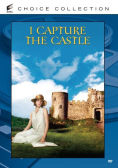I must have been ten or eleven when I first read this novel of an eccentric English family living in a house attached to and using a corner of a partially ruined castle. I didn’t remember anything except that I’d loved it despite my initial disappointment that it wasn’t about King Arthur or magical doings—I’d come to it from The Once and Future King and somehow thought it was going to be similar.
Yet I only had to read the first sentence for the whole story to come flooding back to me, plus a precise memory of where I was when reading it. The voice of Cassandra, who tells the story, is that strong.
Seventeen-year-old Cassandra Mortmain and her family love their dilapidated home. It would be better, though, if they had some money for little things like, oh, having more candles so they can read at night, fixing the leaks in the roof, actually getting enough to eat, and paying the rent.
Her father, a writer, had a very successful book many years ago but hasn’t written since. Her stepmother, Topaz, is a model for whom there aren’t many work opportunities in the depths of the country and London is too expensive. Although a bit drifty, Topaz is even-tempered and has turned out to be adept at fashioning meals out of almost nothing. There’s a brother, Thomas, two years younger, and Stephen, a year older than Cassandra, the son of their maid who stayed on with the Mortmains after her death even though they can’t pay him.
Of her older sister, Cassandra says: “Although I am rather used to her I know she is a beauty. She is nearly twenty-one and very bitter with life.”
See what I mean about the voice? Wanting to be a writer, Cassandra has decided to keep a journal, the book we are reading. She intersperses her record of the oddities of their daily life with her own quite original thoughts and interpretations. I say original, but I remember reading them and thinking Oh yes, that’s EXACTLY the way I feel. And she’s hilarious, sometimes without meaning to be.
I was too young then to recognise the inciting incident, the happening that upends their odd but stable lives. On a rainy night, while Cassandra is taking a bath in front of the kitchen fire, a young man knocks at the door and enters. He and his brother are moving into nearby Scoatney Hall, empty since the death of their uncle who is also the landlord for the Mortmains’ home. The sisters actually joke about Austen’s novel.
In trying to decide what most delights me in this story, I have to give credit to the setting: the peculiar house/castle with its moat and nearby ancient tower. I love the room over the gate where Father retires to “write” every day, but actually reads mystery novels. And Cassandra’s descriptions of their life at home, their jaunts in the English countryside, etc. are quite distinctive. Here’s a bit from her first visit to Scoatney Hall:
We left our wraps in the hall—Topaz had lent us things to save us the shame of wearing our winter coats. There was a wonderful atmosphere of gentle age, a smell of flowers and beeswax, sweet yet faintly sour and musty; a smell that makes you feel very tender towards the past.
I love their hijinks. Not just the imaginative way they live—calling the room between the girls’ room and the adults’ bedroom the “buffer state”, using a dressmaker’s dummy as a confidante and mentor—but the accidental mischief they fall into, like Rose being mistaken for a bear.
Most of all, though, it’s Cassandra’s storytelling, her humor, her peculiar turns of phrase, her odd outlook. Every page holds delightful surprises. If you’ve never read this book, you have a treat in store for you. If you have, try reading it again.
Have you reread a book that you loved when young? Was it as good as you remembered?
